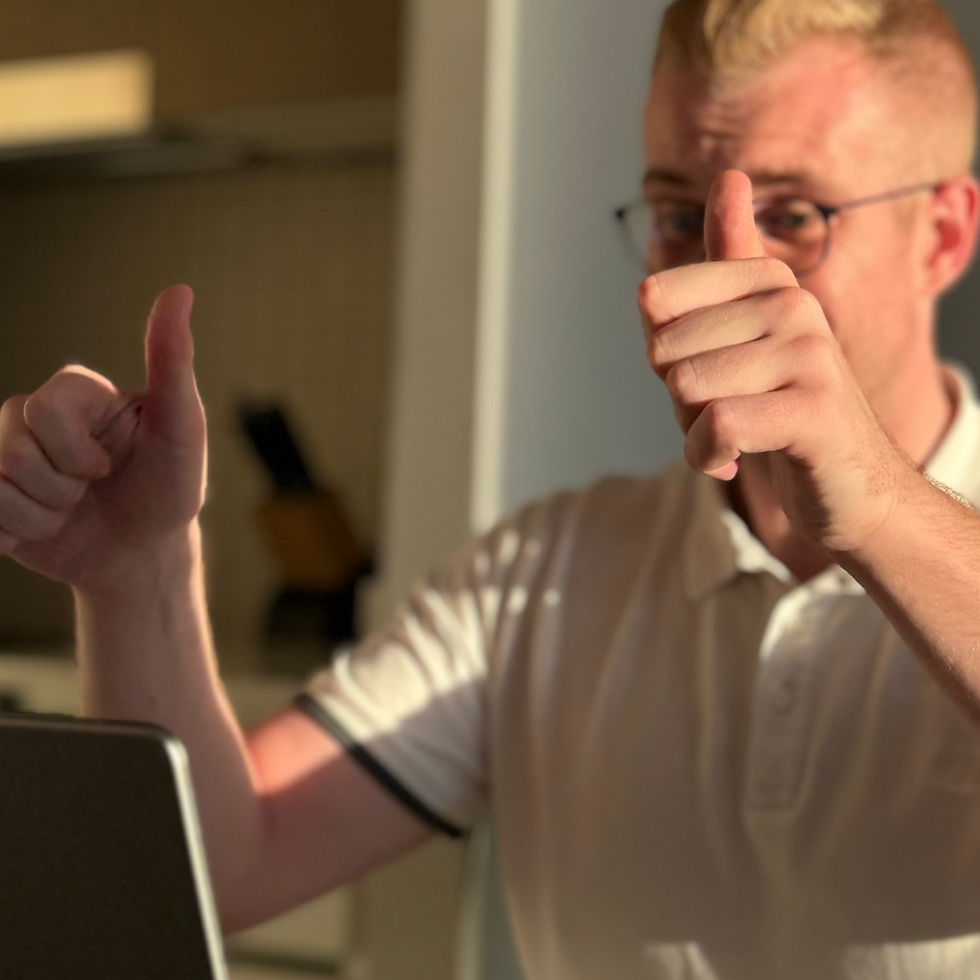Does Watching TV in English Really Work?
- Cami
- Aug 21, 2025
- 4 min read

Hey there!
Welcome, if you are new here! 🤩And welcome back, if you’re already an avid reader of our emails 🥳.
I bet you’ve heard many times that a perfect “lazy” way to practise English is to just watch your favourite show in English. I know, we have recommended it as well… But is it really that simple? Will you actually notice any improvement?
Today, we’ll dive into the myth of how passive watching automatically improves skills. Here’s a little hint: it can help if done strategically.
The truth about “learning through watching”
Does watching in English actually help?
If I had to answer this question off the top of my head, I’d say yes. Why? Due to one main (kind of obvious) reason: Watching shows or movies in English automatically exposes you to natural English.
This is extremely useful if you usually don’t get a chance to use English in any way in your day-to-day life. Watching in English helps you hear different ways to pronounce things, see how idioms might be used in natural speech, and even learning about certain cultural references.
But, (yes, there is a but) this passive learning method only works if:
The content is not too difficult (try to watch something where you understand about 80%, which makes for the best learning environment)
The learner (aka you) is actually watching and not distracted (just put your phone away, you don’t need to reply immediately)
How to make watching effective
If you want to watch actively, be prepared and have a pen and piece of paper with you.
Try to jot down (= write down) 1-2 interesting expressions per episode (keep it light, no need to write down everything that’s being said).
You can re-watch short scenes to focus on pronunciation, intonation or even slang.
Focus on different accents (e.g. British vs American vs Australian) and try to see what words are pronounced differently
Some tips for using subtitles strategically:
Use English subtitles to connect the sounds to the words
Watch it again without subtitles for practising your listening skills
Now, I know not everyone wants to have their TV time feel like a class, and sometimes you just want to relax and watch your show “in peace”. Well, you can still do that (but in English 😉). Just follow these 3 steps:
Choose content you enjoy (you’ll learn more if you want to watch it)
Pick the right level (if it’s too hard, you’ll most likely tune out, and if it’s too easy, you won’t really improve)
Instead of pausing and writing down words, choose one expression that stood out to you and repeat it out loud after watching it. Imagine how many expressions you’ll learn if you do it after a long binge-watching weekend 😁
What to watch
So, we’ve established that it can be very beneficial for your language learning to watch shows and movies in English. The only thing missing is: What to watch.
Here is a short list of some examples, divided by level:
Lower-intermediate (B1):
Sitcoms with clear dialogue, accents and everyday vocabulary (Modern Family, Friends, The Office, Brooklyn Nine-Nine)
Slow pace, British culture and lots of repetition (The Great Bake Off, Call the Midwife, Escape to the Country)
Upper-intermediate (B2):
Modern dramas with everyday speech (The Crown, Downton Abbey, This Is Us)
British Humour and lively dialogues (Gavin & Stacey, Would I Lie to You?)
Rich storytelling and mix of accents (The Queen’s Gambit, Broadchurch, The Good Place, The Durrells)
Advanced (C1-C2):
Fast-paced, idioms and cultural references (Sherlock, Suits, Spooks)
Strong regional accents and colloquial speech (Peaky Blinders, The Responder, Shetland)
Dense political or historical content (House of Cards, Frost/Nixon, The Trial of the Chicago 7)
Extra “lazy” version for how to make watching effective
If all you really want to do is watch your show and disconnect without having to write things down and having to rewatch scenes (I know, this can feel like too much work sometimes!), then simply do this:
Watch something in English and with English subtitles on, but make 0 effort into pausing or taking notes. Just focus on enjoying the story and allow your brain to naturally catch phrases and expressions over time. You might not understand or learn every single word, but it will help your listening and make you more familiar with English rhythm without putting too much effort into it.
Before we finish off, I would like to know what you think. Do you think watching TV in English really works?
Yes!
I'm not convinced :/
Using your TV time can be a very powerful tool in your English learning, as long as you are intentional about it. If you simply leave the TV running in the background, please don’t expect miracles to happen.
Why don’t you try to watch something in English this week and try to use one of the tips we mentioned above? Feel free to let us know how it goes and what you’re watching!
Want to read more?
Check out these past newsletters to keep up-to-date

Getting the Joke: A Guide to English Humour
The tricky art of jokes, puns and British banter. Understanding and using humour in English is a true sign of advanced fluency.

Learning English Smarter, Not Harder
Science says this is how to learn English faster. Spoiler: It’s not about studying harder. Try these 5 evidence-based strategies instead.

How to overcome the fear of speaking English
Scared to speak English? Read this. Speaking English can be intimidating. Let’s talk about how to get over that fear 🌟
See you in the next one!
Cami

.png)


